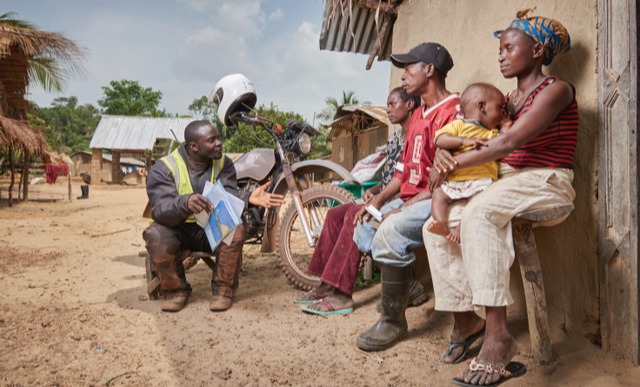By Caitlin Augustin, Director of Product, DataKind
It’s been a busy nine months here at DataKind. We’ve been heads down, working towards a standing body of work where we’ll manage thoughtful, thematically-linked cohorts of DataCorps projects, called DataKind Impact Practices. To drive sector-wide change, DataKind is looking to use data science, machine learning, and AI in the service of Community Health Workers (CHW) who provide life-saving primary healthcare to communities at the last mile. What makes this portfolio of work unique is that it’ll be DataKind’s first Impact Practice: a whole new way to advance a sector with cutting-edge technology.
Before we dive into our first Impact Practice, let’s discuss how digital technologies can play a role in healthcare delivery. According to Last Mile Health, one billion people lack access to healthcare because they live too far from a health facility. Combined with the fact that there’s a global shortage of healthcare workers, with a projected gap of 14.5 million healthcare workers in 2030, the role of CHWs in developing strong, more resilient health systems have increasingly been recognized by governments, NGOs, and international agencies. For instance, it’s estimated that CHWs prevent a child from dying worldwide every three seconds and evidence indicates that effectively trained, deployed, and managed CHWs also help reduce maternal mortality and the spread of infectious diseases.
It’s crucial, then, to deploy not only traditional models of support – additional funding, care resources, and training systems – but to embrace innovative and disruptive solutions to achieve universal healthcare coverage.1 There’s consensus that digital health, and associated processes and tools, represents an opportunity to ensure adequate service delivery by CHWs. Consortiums such as the Community Health Impact Coalition and the One Million Community Health Workers Campaign were founded to identify synergies across government, platforms, industry, and NGOs. From telemedical interventions to community identification using image detection, to minimal viable training programs, to outbreak prediction and proactive health risk mitigation, it’s clear that machine learning and AI have the power to augment existing systems of health delivery and provide insights in previously unmined organization-spanning data troves.
Through a series of in-depth conversations with organizations (including Medic Mobile, Last Mile Health, and Living Goods), we know significant human problems remain in the CHW recruitment, training, deployment, management, and retention spaces as well as in digital health tool deployment, usage, and validation. And yet, given this landscape and the results of multiple academic meta-studies, we believe the CHW sector to be data mature, and we’ve started to see places that data science, machine learning, and AI could be introduced to support existing workflows.
To that end, we’re thrilled to share that we’re launching an innovative portfolio of projects in October 2019 to improve global health outcomes. We’ve teamed up with amazing partners to launch the first cohort of DataCorps projects under our DataKind Community Health Workers Impact Practice. Jacaranda Health, Medic Mobile, and Riders for Health work with CHWs to deliver life-saving primary healthcare to the hardest-to-reach communities and most vulnerable populations. We’ve surfaced a number of opportunities for the development of data science, machine learning, and AI tools that will not only advance the missions of our partners, but also deliver insights to drive sector-wide impact and improve health outcomes for millions of people.
If this sounds like a cause you’d love to lend your experience towards, read on to learn more about each project. If you’re interested in being considered as a volunteer and have the skills required, we encourage you to apply here. For each project, we’re looking for Data Ambassadors, Data Experts, Project Managers, and folks aligned with DataKind’s mission and values. If you can’t join us for this cohort then keep a look out for a second cohort launching before the end of the year.
At DataKind, our model of facilitating transformative projects between pro bono data scientists and mission-driven organizations has worked in the past, which is why we’re excited to bring that same caliber of work to the CHW space. In general, we always approach work ethically and responsibly (see our principles and practical instructions), and this goes doubly when dealing with health data. We’ll be extra vigilant about collaborating with local partners to make sure we’re operating responsibly and in the service of people who need help most.
Photo above courtesy of Riders for Health.
Quick Links
- Creating a Systems Change Approach for Data Science & AI Solutions
- DataKind Launches Search for Chief Program Officer
- The Next Chapter in Using Data Science & AI in the Service of Humanity
- A Step Change: DataKind Raises $20M Investment to Support the Data Science for Social Good Ecosystem
- Five Principles for Applying Data Science for Social Good
1Richard Scheffler,* Giorgio Cometto,* Kate Tulenko, Tim Bruckner, Jenny Liu, Eric L. Keuffel, Alexander Preker, Barbara Stilwell, Julia Brasileiro, James Campbell. Health workforce requirements for universal health coverage and the Sustainable Development Goals – Background paper N.1 to the WHO Global Strategy on Human Resources for Health: Workforce 2030. Human Resources for Health Observer Series No 17. World Health Organization, 2016.



